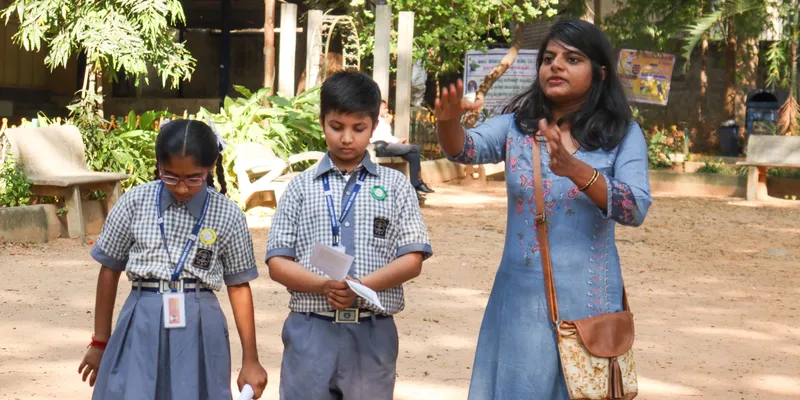This organisation is connecting students to nature through diverse experiences
Thicket Tales, a Bengaluru-based organisation founded by Saidevi Sanjeeviraja, makes learning fun and interesting for students through nature-immersive experiences like walks, story-telling, and more.
Saidevi Sanjeeviraja grew up in Rajapalayam, a town in Tamil Nadu near Srivilliputhur, home to the Grizzled Squirrel Wildlife Sanctuary, a preserved forest south of the Palakkad Gap.
She remembers being in close proximity with nature; studying in a school that spread over 30 acres and with civets, peacocks, lizards, and snakes all around.

Saidevi with students
“It was a small town and I had a lot of free time on my hands to be with nature. My mother taught in the school I studied, and holidays meant I would tag along with my mother because she had work. I was surrounded by nature all the time,” she tells SocialStory.
But like most Indian parents, Sanjeeviraja was advised not to take up an unconventional career. She moved to Coimbatore to study finance and international business, but her heart beat for nature and followed its path.
The nature connect
She says her parents couldn’t say “no” forever and allowed her to pursue what she loved.
Sanjeeviraja moved to Bengaluru when she got an opportunity to work with an elephant scientist who focused on elephant corridors in the state. During that time, she started organising nature walks.
“As a child, I loved nature walks—identifying different species of birds, but I observed that children in Bengaluru had so much of nature around them but the interest was not there. It made me reflect on the ever-questioning nature of childhood, always curious and eager to learn more,” she shares.
Sanjeeviraja believed that this should be a given for every child growing up—asking questions and seeking answers. But she found that most students expressed that they were bored with their school subject and did not find it very relevant to their lives. Also, there was very little after-school engagement or activities and a drastic lack of connection with nature or outdoor activities.
Without a background in the Sciences, she decided to organise a “gamified” walk for children in Cubbon Park in 2020, just before the pandemic hit. Purely through an Instagram post and word of mouth, seven children turned up and she was thrilled to answer a lot of “why” and “how” questions. They participated in a treasure hunt and mostly found their own answers.
A bunch of children as excited as her encouraged Sanjeeviraja to start hosting online sessions during the pandemic, complete with story-telling and interactive sessions with experts. She started writing stories and conceptualising sessions completely nature-based.
Children and their families joined and this led to Thicket Tales, a nature-based education organisation working towards connecting people to nature through gamified experiences in 2023.
Shifting mindsets
After the lockdown was lifted, Sanjeeviraja resumed offline sessions.
She recalls hosting a programme on snakes for a local NGO, Makkala Jagriti.
“The session had a lot of drama; we were exploring a lot of things, including whether snakes take revenge. We had children making origami models of a basket the size of a snake's brain, writing poems and having fun,” she explains.
Thicket Tales runs a flagship programme called Learn Around Nature, where it works with middle schoolers in 6th, 7th and 8th graders from low-income families to help visualise science and social science through nature immersive experiences—experiences, nature walks, discussions, and group activities.
Learn Around Nature is scheduled for 80 minutes every week and is an experiential programme that lasts a year. It encourages multi-disciplinary thinking applying facts to learn more concepts, connecting subjects together in the form of discussion or activities. Schools also apply for permission to take the students to BBMP parks for these.
The other programme from Thicket Tales, GreenGen Explorers, helps children to connect with the biodiversity of parks with scientific, exploratory outings. It will be working with 50 schools and 50 parks in Bengaluru for this project.
The organisation works with two-full-time facilitators—a trained biologist, a science communicator, and an academic director.
The programmes are offered free of cost and Thicket Tales raises funds from donors. It is incubated with the Circle, a two-year fully-paid incubation programme that helps entrepreneurs create and launch innovative learning centres for children.
“Initially, people were sceptical of how this would work and thought it was nonsense. Now that we collected several data points and took several people to these classrooms, released videos of our work and released our assessments, people are slowly warming up to the idea,” Sanjeeviraja says.
Thicket Tales is now looking at two models to scale its efforts.
“One could be a fellowship where we work with low-income schools, train their teachers and handhold them for two years by providing them with the right tools to make the mindset shift. The other is developing programs in-house,” she concludes.
Edited by Megha Reddy






